Unit 3 Sea Exploration Learning About Language课件(共39张)-高中英语人教版(2019)选择性必修第四册(共40页PPT)
文档属性
| 名称 | Unit 3 Sea Exploration Learning About Language课件(共39张)-高中英语人教版(2019)选择性必修第四册(共40页PPT) |  | |
| 格式 | pptx | ||
| 文件大小 | 13.1MB | ||
| 资源类型 | 教案 | ||
| 版本资源 | 人教版(2019) | ||
| 科目 | 英语 | ||
| 更新时间 | 2025-04-01 22:18:46 | ||
图片预览

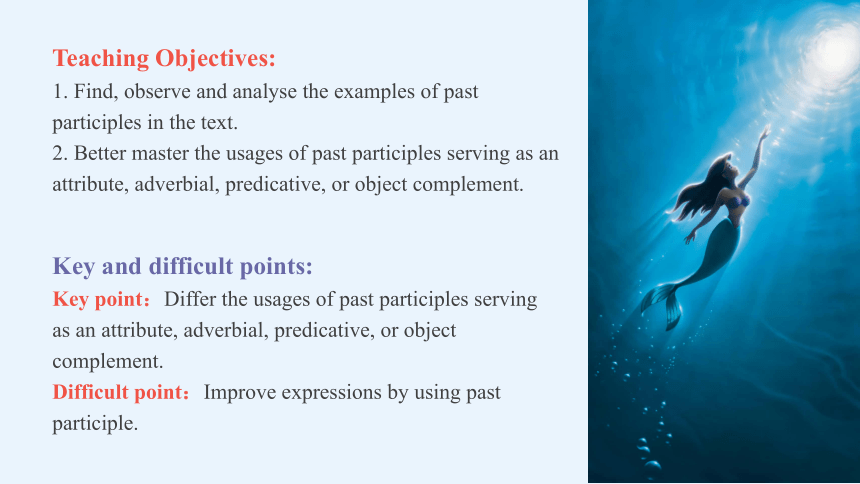


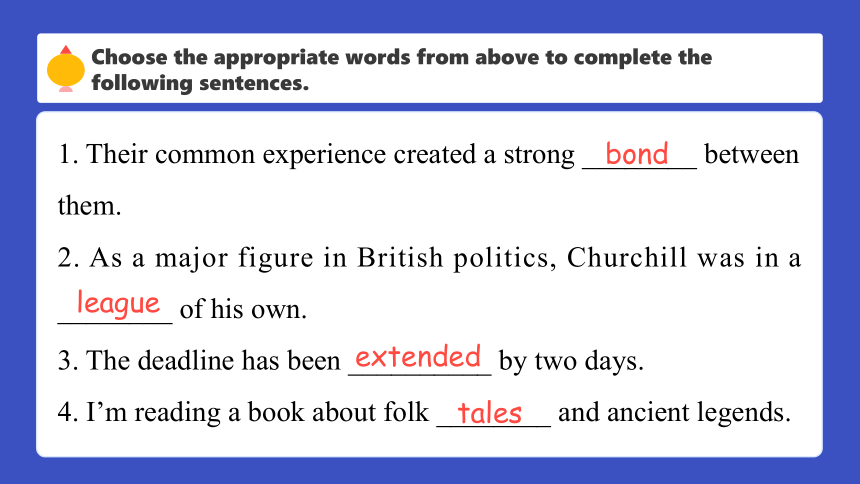
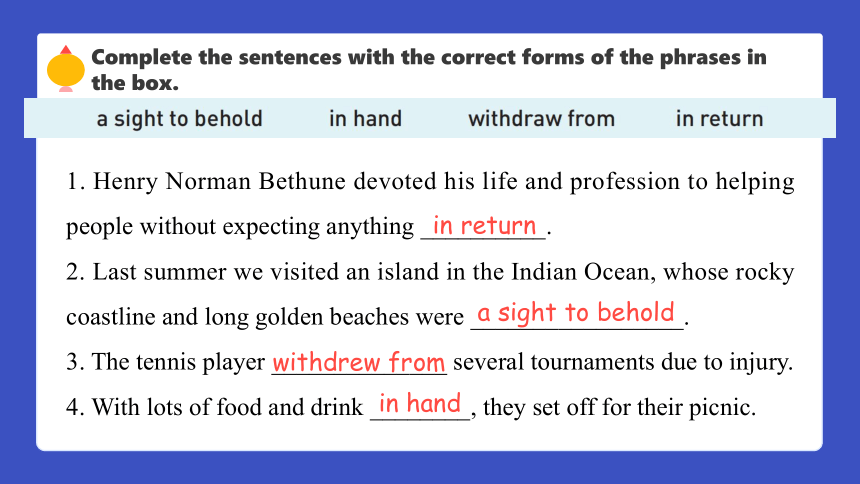
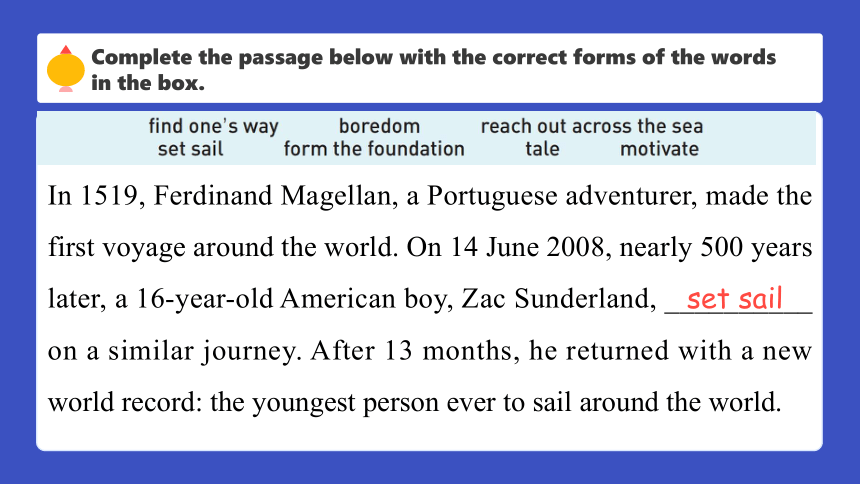
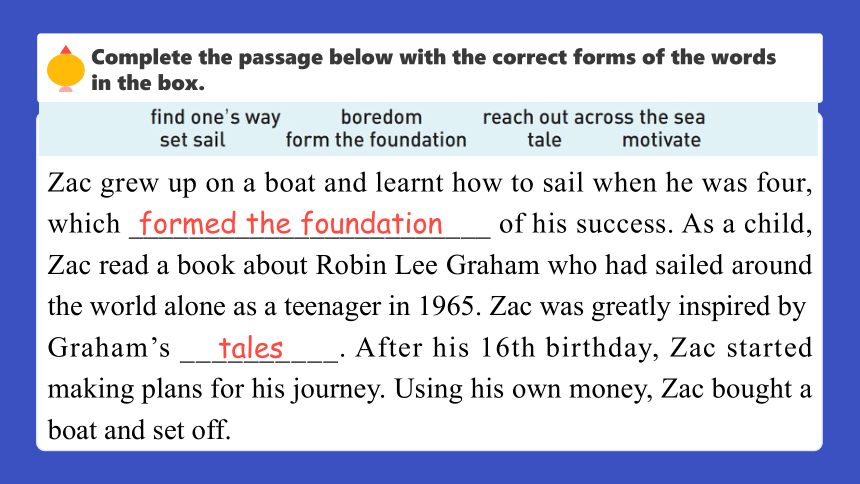


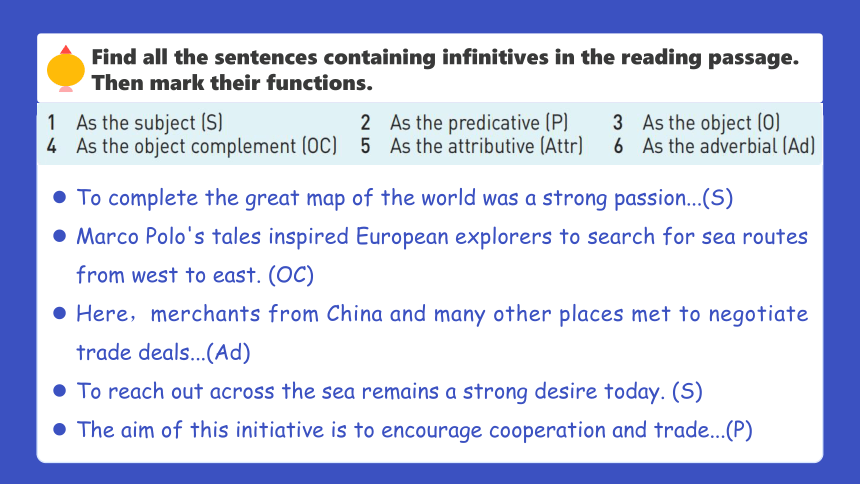
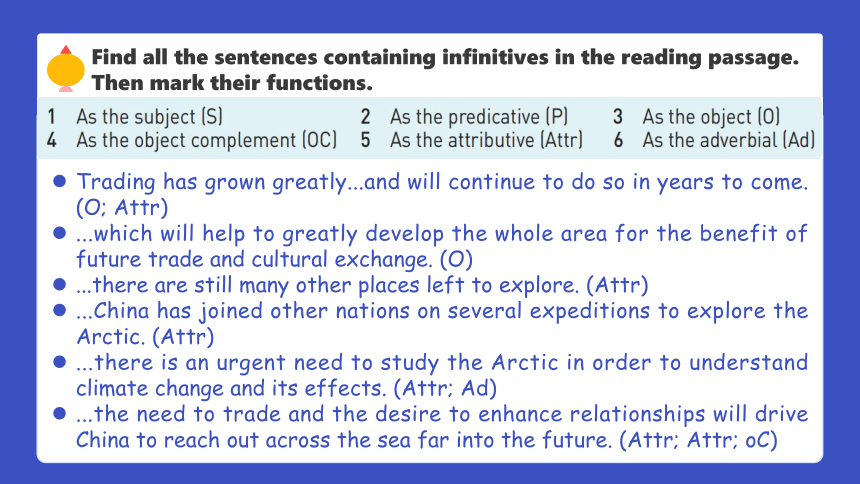
文档简介
(共39张PPT)
Unit 3
Sea Exploration
Learning About Language
Teaching Objectives:
1. Find, observe and analyse the examples of past participles in the text.
2. Better master the usages of past participles serving as an attribute, adverbial, predicative, or object complement.
Key and difficult points:
Key point:Differ the usages of past participles serving as an attribute, adverbial, predicative, or object complement.
Difficult point:Improve expressions by using past participle.
Part 1
Build up your vocabulary
Write down the word that matches each definition. Then find the sentences containing these words in the text.
1. ________ an imaginary story or an exciting description of an event
2. ________ related to the king or queen of a country
3. ___________ to reach an agreement by discussion
4. ___________ to stop taking part in an activity
5. ___________ to make something longer or larger
6. ________ a connection between people
7. ________ a level of quality, ability, etc.
8. ________ a deep passage of water used as a route for ships
tale
royal
negotiate
withdraw
extend
bond
league
channel
Choose the appropriate words from above to complete the following sentences.
1. Their common experience created a strong ________ between them.
2. As a major figure in British politics, Churchill was in a ________ of his own.
3. The deadline has been __________ by two days.
4. I’m reading a book about folk ________ and ancient legends.
bond
league
extended
tales
Complete the sentences with the correct forms of the phrases in the box.
1. Henry Norman Bethune devoted his life and profession to helping people without expecting anything __________.
2. Last summer we visited an island in the Indian Ocean, whose rocky coastline and long golden beaches were _________________.
3. The tennis player ______________ several tournaments due to injury.
4. With lots of food and drink ________, they set off for their picnic.
in return
a sight to behold
withdrew from
in hand
Complete the passage below with the correct forms of the words in the box.
In 1519, Ferdinand Magellan, a Portuguese adventurer, made the first voyage around the world. On 14 June 2008, nearly 500 years later, a 16-year-old American boy, Zac Sunderland, __________ on a similar journey. After 13 months, he returned with a new world record: the youngest person ever to sail around the world.
set sail
Complete the passage below with the correct forms of the words in the box.
Zac grew up on a boat and learnt how to sail when he was four, which ________________________ of his success. As a child, Zac read a book about Robin Lee Graham who had sailed around the world alone as a teenager in 1965. Zac was greatly inspired by Graham’s __________. After his 16th birthday, Zac started making plans for his journey. Using his own money, Zac bought a boat and set off.
formed the foundation
tales
Complete the passage below with the correct forms of the words in the box.
_____________________________ is often a mixture of danger and __________. Zac had to _______________ through heavy storms and get by on little sleep on his journey. It was boring to stay on a boat all day, so Zac read lots of books! He also emailed his family using his laptop, telling them about his experiences around the world.
When the journey ended, Zac’s adventure received widespread media coverage. At his press conference, he talked about how passion and courage made his dream come true. In his opinion, there’s so much that people can achieve with the right ____________ and ambition. Just go for it!
Reaching out across the sea
boredom
find his way
motivation
Part 2
复习不定式
Find all the sentences containing infinitives in the reading passage. Then mark their functions.
To complete the great map of the world was a strong passion...(S)
Marco Polo's tales inspired European explorers to search for sea routes from west to east. (OC)
Here,merchants from China and many other places met to negotiate trade deals...(Ad)
To reach out across the sea remains a strong desire today. (S)
The aim of this initiative is to encourage cooperation and trade...(P)
Find all the sentences containing infinitives in the reading passage. Then mark their functions.
Trading has grown greatly...and will continue to do so in years to come. (O; Attr)
...which will help to greatly develop the whole area for the benefit of future trade and cultural exchange. (O)
...there are still many other places left to explore. (Attr)
...China has joined other nations on several expeditions to explore the Arctic. (Attr)
...there is an urgent need to study the Arctic in order to understand climate change and its effects. (Attr; Ad)
...the need to trade and the desire to enhance relationships will drive China to reach out across the sea far into the future. (Attr; Attr; oC)
不定式作主语时,谓语动词通常用单数形式。
To master a musical instrument requires long-term practice.
掌握一种乐器需要长期练习。
不定式的用法
作主语
To solve this complex math problem needs patience and logical thinking.
解决这道复杂的数学题需要耐心和逻辑思维。
To build a good relationship with classmates is beneficial for your school life.
与同学建立良好关系对你的校园生活有益。
为避免句子结构头重脚轻,常用"it"作形式主语,将真正的主语不定式后置。
It is important to get up early every day.
每天早起很重要。
不定式的用法
作主语
It is necessary to read a lot of books to expand your knowledge. 读大量的书来扩充知识很有必要。
It is challenging to run a marathon for the first time.
第一次跑马拉松具有挑战性。
许多及物动词后常接不定式作宾语。
She decided to take a gap year before going to college.
她决定在上大学前休一年假。
不定式的用法
作宾语
She planned to start his own business after graduation.
她计划毕业后创业。
They agreed to meet at the coffee shop at 3 o'clock.
他们同意三点在咖啡店见面。
当复合宾语中的宾语是不定式时,一般用 “it” 作形式宾语,把不定式放在宾语补足语之后。
We consider it our duty to protect the environment.
我们认为保护环境是我们的责任。
不定式的用法
作宾语
They found it hard to understand the ancient poem.
他们觉得理解这首古诗很难。
I think it important to keep a positive attitude in difficult situations.
我认为在困难情况下保持积极态度很重要。
不定式作表语常表示具体的、一次性的动作或将来的动作。
Her dream is to become a famous scientist.
她的梦想是成为一名著名科学家。
不定式的用法
作表语
Her aim is to win the championship in the upcoming competition. 她的目标是在即将到来的比赛中赢得冠军。
若主语是 aim, duty, hope, idea, job, plan, problem, purpose, thing, wish 等名词,不定式作表语是对主语内容的具体说明。
I have a report to write this afternoon.
今天下午我有一份报告要写。
不定式的用法
作定语
She has a lot of clothes to wash on weekends.
她周末有很多衣服要洗。
She bought a book to read during the long journey.
她买了一本书在长途旅行中阅读。
不定式作表语常表示具体的、一次性的动作或将来的动作。
不定式的用法
作定语
当被修饰的名词是"ability, chance, courage, decision, effort, intention, need, opportunity, reason, right"等时,常用不定式作定语,且不定式与被修饰词之间存在逻辑上的主谓、动宾或同位关系。
She has the ability to finish this task independently.
她有独立完成这项任务的能力。
We have a good chance to visit the famous museum tomorrow.
我们明天有个很好的机会参观著名博物馆。
Her decision to study abroad surprised everyone.
她出国留学的决定让大家都很惊讶。
不定式的用法
作定语
当不定式修饰 “way, place, time” 等名词时,后面的介词常可省略。
This is the best way to solve the problem (in).
这是解决问题的最佳方法。
That is a wonderful place to spend our holiday (at).
那是个度假的好地方。
Do you have the right time to have a talk with me (at)
你有合适的时间和我聊聊吗?
不定式的用法
作状语
目的状语:不定式可位于句首、句末或句中作目的状语。为了强调目的,可在不定式前加 “in order to” 或 “so as to”,但 “so as to” 不能用于句首。
To get a better grade, he studied hard every night.
为了取得更好的成绩,他每晚都努力学习。
She went to the library to borrow some reference books. 她去图书馆借一些参考书。
In order to catch the first bus, he got up at 5 o'clock.
为了赶上第一班公交车,他五点就起床了。
不定式的用法
作状语
结果状语:常与 “only” 连用,表示意外的结果。
He worked hard day and night, only to fail in the exam.
他日夜努力学习,结果却考试不及格。
She ran all the way to the station, only to find the train had left. 她一路跑到车站,结果却发现火车已经开走了。
They hurried to the airport, only to be told the flight was cancelled.
他们匆忙赶到机场,结果却被告知航班取消了。
不定式的用法
作状语
原因状语:用于某些形容词后,说明产生某种情绪的原因。常见的形容词有 “happy, glad, pleased, sad, sorry, surprised, excited” 等。
I'm happy to see my old friends again.
再次见到老朋友我很高兴。
She was excited to hear that she had won the first prize. 听到自己得了一等奖,她很兴奋。
We are sorry to hear about your loss.
听到你的损失,我们很难过。
不定式的用法
作宾语补足语
一些动词如 “advise, beg, cause, command, enable, forbid, force, instruct, invite, oblige, persuade, remind, teach, urge” 等后常接不定式作宾语补足语,构成 “动词 + 宾语 + 不定式” 结构。
The teacher advised the students to read more English stories. 老师建议学生多读英语故事。
He begged his mother to buy him a new toy.
他恳求妈妈给他买一个新玩具。
The coach commanded the players to run faster.
教练命令队员们跑得更快些。
不定式的用法
作宾语补足语
使役动词 “let, make, have” 和感官动词 “see, watch, observe, notice, hear, listen to, feel” 等后接不带 “to” 的不定式作宾语补足语,但在被动语态中要加上 “to”。
Let him go home now.(让他现在回家。)→He was let to go home by us.(他被我们允许回家。) We made the little boy cry.(我们把小男孩弄哭了。)→The little boy was made to cry by us.(小男孩被我们弄哭了。) I saw her enter the classroom.(我看见她走进教室。)→She was seen to enter the classroom.(有人看见她走进教室。)
Part 4
不定式的时态和语态
不定式的一般式
表示的动作与谓语动词表示的动作同时发生或在其后发生。
I want to go shopping this afternoon.
我今天下午想去购物。
He hopes to visit his grandparents next week.
他希望下周去看望祖父母。
They plan to start the project tomorrow.
他们计划明天启动项目。
不定式的进行式
表示的动作与谓语动词表示的动作同时进行,强调动作正在进行。
She seems to be dancing in the room now.
她现在好像正在房间里跳舞。
The students appear to be discussing an interesting topic.
学生们似乎正在讨论一个有趣的话题。
He pretended to be reading when his mother came in.
妈妈进来时他假装正在看书。
不定式的完成式
表示的动作在谓语动词表示的动作之前发生。
He is said to have studied abroad for five years.
据说他已经在国外学习了五年。
They are believed to have finished the work ahead of time.
人们认为他们已经提前完成了工作。
She seems to have known the truth already.
她似乎已经知道真相了。
不定式的被动式
当不定式的逻辑主语是动作的承受者时,要用被动式。
The problem needs to be solved as soon as possible.
这个问题需要尽快解决。
The letter is to be sent by express mail.
这封信要用特快专递寄出。
The work is expected to be completed in two weeks.
这项工作预计两周内完成。
不定式的否定形式
在不定式前加 “not” 构成否定形式。
Tell him not to play computer games too late.
告诉他不要玩电脑游戏到太晚。
The teacher asked us not to make noise in class.
老师要求我们在课堂上不要吵闹。
My parents told me not to trust strangers easily.
我父母告诉我不要轻易相信陌生人。
省略 “to” 的不定式
(一)在"had better, would rather, rather than, why not"等结构后,用省略"to"的不定式。
You'd better stay at home during the storm.
暴风雨期间你最好待在家里。
(二)当两个或多个不定式由"and, or, but"等连接时,第二个及后面的不定式常省略"to"。
You'd better stay at home during the storm.
暴风雨期间你最好待在家里。
省略 “to” 的不定式
(三)在"let, make, have"等使役动词和"see, watch, hear, feel, notice"等感官动词后作宾语补足语时,省略"to",但在被动语态中要加上"to"。
Let them do it by themselves. 让他们自己做这件事。
→They were let to do it by themselves.
他们被允许自己做这件事。
We heard her sing a beautiful song. 我们听到她唱了一首动听的歌。
→She was heard to sing a beautiful song.
有人听到她唱了一首动听的歌。
Part 6
Exercise
Join the words to make sentences using infinitives. Then decide the function of each infinitive.
Join the words to make sentences using infinitives. Then decide the function of each infinitive.
1. He encouraged me to participate in the surfing competition. (OC)
2. The storm seems to be getting closer. (P)
3. Magellan was the first person to sail around the world. (Attr)
4. The UN peacekeeping force aims to maintain peace and prevent armed conflicts. (O)
5. The crowd stood to applaud scientists for their important ocean research work. (Ad)
6. It is a good idea to tax plastic bottles so that people use them less. (Attr)
7. The Jiaolong manned submersible is said to be able to reach 7 km underwater. (O; O)
8. It remains to be seen whether or not his capsule can work. (O)
Read the beginning of The Little Mermaid and use the proper forms of the verbs in brackets to fill in the blanks. What do you think happens next
to measure
to see
dancing
formed
to have been born
Read the beginning of The Little Mermaid and use the proper forms of the verbs in brackets to fill in the blanks. What do you think happens next
to play
swimming
/to swim
swimming
not to worry
SEE YOU NEXT TIME
Unit 3
Sea Exploration
Learning About Language
Teaching Objectives:
1. Find, observe and analyse the examples of past participles in the text.
2. Better master the usages of past participles serving as an attribute, adverbial, predicative, or object complement.
Key and difficult points:
Key point:Differ the usages of past participles serving as an attribute, adverbial, predicative, or object complement.
Difficult point:Improve expressions by using past participle.
Part 1
Build up your vocabulary
Write down the word that matches each definition. Then find the sentences containing these words in the text.
1. ________ an imaginary story or an exciting description of an event
2. ________ related to the king or queen of a country
3. ___________ to reach an agreement by discussion
4. ___________ to stop taking part in an activity
5. ___________ to make something longer or larger
6. ________ a connection between people
7. ________ a level of quality, ability, etc.
8. ________ a deep passage of water used as a route for ships
tale
royal
negotiate
withdraw
extend
bond
league
channel
Choose the appropriate words from above to complete the following sentences.
1. Their common experience created a strong ________ between them.
2. As a major figure in British politics, Churchill was in a ________ of his own.
3. The deadline has been __________ by two days.
4. I’m reading a book about folk ________ and ancient legends.
bond
league
extended
tales
Complete the sentences with the correct forms of the phrases in the box.
1. Henry Norman Bethune devoted his life and profession to helping people without expecting anything __________.
2. Last summer we visited an island in the Indian Ocean, whose rocky coastline and long golden beaches were _________________.
3. The tennis player ______________ several tournaments due to injury.
4. With lots of food and drink ________, they set off for their picnic.
in return
a sight to behold
withdrew from
in hand
Complete the passage below with the correct forms of the words in the box.
In 1519, Ferdinand Magellan, a Portuguese adventurer, made the first voyage around the world. On 14 June 2008, nearly 500 years later, a 16-year-old American boy, Zac Sunderland, __________ on a similar journey. After 13 months, he returned with a new world record: the youngest person ever to sail around the world.
set sail
Complete the passage below with the correct forms of the words in the box.
Zac grew up on a boat and learnt how to sail when he was four, which ________________________ of his success. As a child, Zac read a book about Robin Lee Graham who had sailed around the world alone as a teenager in 1965. Zac was greatly inspired by Graham’s __________. After his 16th birthday, Zac started making plans for his journey. Using his own money, Zac bought a boat and set off.
formed the foundation
tales
Complete the passage below with the correct forms of the words in the box.
_____________________________ is often a mixture of danger and __________. Zac had to _______________ through heavy storms and get by on little sleep on his journey. It was boring to stay on a boat all day, so Zac read lots of books! He also emailed his family using his laptop, telling them about his experiences around the world.
When the journey ended, Zac’s adventure received widespread media coverage. At his press conference, he talked about how passion and courage made his dream come true. In his opinion, there’s so much that people can achieve with the right ____________ and ambition. Just go for it!
Reaching out across the sea
boredom
find his way
motivation
Part 2
复习不定式
Find all the sentences containing infinitives in the reading passage. Then mark their functions.
To complete the great map of the world was a strong passion...(S)
Marco Polo's tales inspired European explorers to search for sea routes from west to east. (OC)
Here,merchants from China and many other places met to negotiate trade deals...(Ad)
To reach out across the sea remains a strong desire today. (S)
The aim of this initiative is to encourage cooperation and trade...(P)
Find all the sentences containing infinitives in the reading passage. Then mark their functions.
Trading has grown greatly...and will continue to do so in years to come. (O; Attr)
...which will help to greatly develop the whole area for the benefit of future trade and cultural exchange. (O)
...there are still many other places left to explore. (Attr)
...China has joined other nations on several expeditions to explore the Arctic. (Attr)
...there is an urgent need to study the Arctic in order to understand climate change and its effects. (Attr; Ad)
...the need to trade and the desire to enhance relationships will drive China to reach out across the sea far into the future. (Attr; Attr; oC)
不定式作主语时,谓语动词通常用单数形式。
To master a musical instrument requires long-term practice.
掌握一种乐器需要长期练习。
不定式的用法
作主语
To solve this complex math problem needs patience and logical thinking.
解决这道复杂的数学题需要耐心和逻辑思维。
To build a good relationship with classmates is beneficial for your school life.
与同学建立良好关系对你的校园生活有益。
为避免句子结构头重脚轻,常用"it"作形式主语,将真正的主语不定式后置。
It is important to get up early every day.
每天早起很重要。
不定式的用法
作主语
It is necessary to read a lot of books to expand your knowledge. 读大量的书来扩充知识很有必要。
It is challenging to run a marathon for the first time.
第一次跑马拉松具有挑战性。
许多及物动词后常接不定式作宾语。
She decided to take a gap year before going to college.
她决定在上大学前休一年假。
不定式的用法
作宾语
She planned to start his own business after graduation.
她计划毕业后创业。
They agreed to meet at the coffee shop at 3 o'clock.
他们同意三点在咖啡店见面。
当复合宾语中的宾语是不定式时,一般用 “it” 作形式宾语,把不定式放在宾语补足语之后。
We consider it our duty to protect the environment.
我们认为保护环境是我们的责任。
不定式的用法
作宾语
They found it hard to understand the ancient poem.
他们觉得理解这首古诗很难。
I think it important to keep a positive attitude in difficult situations.
我认为在困难情况下保持积极态度很重要。
不定式作表语常表示具体的、一次性的动作或将来的动作。
Her dream is to become a famous scientist.
她的梦想是成为一名著名科学家。
不定式的用法
作表语
Her aim is to win the championship in the upcoming competition. 她的目标是在即将到来的比赛中赢得冠军。
若主语是 aim, duty, hope, idea, job, plan, problem, purpose, thing, wish 等名词,不定式作表语是对主语内容的具体说明。
I have a report to write this afternoon.
今天下午我有一份报告要写。
不定式的用法
作定语
She has a lot of clothes to wash on weekends.
她周末有很多衣服要洗。
She bought a book to read during the long journey.
她买了一本书在长途旅行中阅读。
不定式作表语常表示具体的、一次性的动作或将来的动作。
不定式的用法
作定语
当被修饰的名词是"ability, chance, courage, decision, effort, intention, need, opportunity, reason, right"等时,常用不定式作定语,且不定式与被修饰词之间存在逻辑上的主谓、动宾或同位关系。
She has the ability to finish this task independently.
她有独立完成这项任务的能力。
We have a good chance to visit the famous museum tomorrow.
我们明天有个很好的机会参观著名博物馆。
Her decision to study abroad surprised everyone.
她出国留学的决定让大家都很惊讶。
不定式的用法
作定语
当不定式修饰 “way, place, time” 等名词时,后面的介词常可省略。
This is the best way to solve the problem (in).
这是解决问题的最佳方法。
That is a wonderful place to spend our holiday (at).
那是个度假的好地方。
Do you have the right time to have a talk with me (at)
你有合适的时间和我聊聊吗?
不定式的用法
作状语
目的状语:不定式可位于句首、句末或句中作目的状语。为了强调目的,可在不定式前加 “in order to” 或 “so as to”,但 “so as to” 不能用于句首。
To get a better grade, he studied hard every night.
为了取得更好的成绩,他每晚都努力学习。
She went to the library to borrow some reference books. 她去图书馆借一些参考书。
In order to catch the first bus, he got up at 5 o'clock.
为了赶上第一班公交车,他五点就起床了。
不定式的用法
作状语
结果状语:常与 “only” 连用,表示意外的结果。
He worked hard day and night, only to fail in the exam.
他日夜努力学习,结果却考试不及格。
She ran all the way to the station, only to find the train had left. 她一路跑到车站,结果却发现火车已经开走了。
They hurried to the airport, only to be told the flight was cancelled.
他们匆忙赶到机场,结果却被告知航班取消了。
不定式的用法
作状语
原因状语:用于某些形容词后,说明产生某种情绪的原因。常见的形容词有 “happy, glad, pleased, sad, sorry, surprised, excited” 等。
I'm happy to see my old friends again.
再次见到老朋友我很高兴。
She was excited to hear that she had won the first prize. 听到自己得了一等奖,她很兴奋。
We are sorry to hear about your loss.
听到你的损失,我们很难过。
不定式的用法
作宾语补足语
一些动词如 “advise, beg, cause, command, enable, forbid, force, instruct, invite, oblige, persuade, remind, teach, urge” 等后常接不定式作宾语补足语,构成 “动词 + 宾语 + 不定式” 结构。
The teacher advised the students to read more English stories. 老师建议学生多读英语故事。
He begged his mother to buy him a new toy.
他恳求妈妈给他买一个新玩具。
The coach commanded the players to run faster.
教练命令队员们跑得更快些。
不定式的用法
作宾语补足语
使役动词 “let, make, have” 和感官动词 “see, watch, observe, notice, hear, listen to, feel” 等后接不带 “to” 的不定式作宾语补足语,但在被动语态中要加上 “to”。
Let him go home now.(让他现在回家。)→He was let to go home by us.(他被我们允许回家。) We made the little boy cry.(我们把小男孩弄哭了。)→The little boy was made to cry by us.(小男孩被我们弄哭了。) I saw her enter the classroom.(我看见她走进教室。)→She was seen to enter the classroom.(有人看见她走进教室。)
Part 4
不定式的时态和语态
不定式的一般式
表示的动作与谓语动词表示的动作同时发生或在其后发生。
I want to go shopping this afternoon.
我今天下午想去购物。
He hopes to visit his grandparents next week.
他希望下周去看望祖父母。
They plan to start the project tomorrow.
他们计划明天启动项目。
不定式的进行式
表示的动作与谓语动词表示的动作同时进行,强调动作正在进行。
She seems to be dancing in the room now.
她现在好像正在房间里跳舞。
The students appear to be discussing an interesting topic.
学生们似乎正在讨论一个有趣的话题。
He pretended to be reading when his mother came in.
妈妈进来时他假装正在看书。
不定式的完成式
表示的动作在谓语动词表示的动作之前发生。
He is said to have studied abroad for five years.
据说他已经在国外学习了五年。
They are believed to have finished the work ahead of time.
人们认为他们已经提前完成了工作。
She seems to have known the truth already.
她似乎已经知道真相了。
不定式的被动式
当不定式的逻辑主语是动作的承受者时,要用被动式。
The problem needs to be solved as soon as possible.
这个问题需要尽快解决。
The letter is to be sent by express mail.
这封信要用特快专递寄出。
The work is expected to be completed in two weeks.
这项工作预计两周内完成。
不定式的否定形式
在不定式前加 “not” 构成否定形式。
Tell him not to play computer games too late.
告诉他不要玩电脑游戏到太晚。
The teacher asked us not to make noise in class.
老师要求我们在课堂上不要吵闹。
My parents told me not to trust strangers easily.
我父母告诉我不要轻易相信陌生人。
省略 “to” 的不定式
(一)在"had better, would rather, rather than, why not"等结构后,用省略"to"的不定式。
You'd better stay at home during the storm.
暴风雨期间你最好待在家里。
(二)当两个或多个不定式由"and, or, but"等连接时,第二个及后面的不定式常省略"to"。
You'd better stay at home during the storm.
暴风雨期间你最好待在家里。
省略 “to” 的不定式
(三)在"let, make, have"等使役动词和"see, watch, hear, feel, notice"等感官动词后作宾语补足语时,省略"to",但在被动语态中要加上"to"。
Let them do it by themselves. 让他们自己做这件事。
→They were let to do it by themselves.
他们被允许自己做这件事。
We heard her sing a beautiful song. 我们听到她唱了一首动听的歌。
→She was heard to sing a beautiful song.
有人听到她唱了一首动听的歌。
Part 6
Exercise
Join the words to make sentences using infinitives. Then decide the function of each infinitive.
Join the words to make sentences using infinitives. Then decide the function of each infinitive.
1. He encouraged me to participate in the surfing competition. (OC)
2. The storm seems to be getting closer. (P)
3. Magellan was the first person to sail around the world. (Attr)
4. The UN peacekeeping force aims to maintain peace and prevent armed conflicts. (O)
5. The crowd stood to applaud scientists for their important ocean research work. (Ad)
6. It is a good idea to tax plastic bottles so that people use them less. (Attr)
7. The Jiaolong manned submersible is said to be able to reach 7 km underwater. (O; O)
8. It remains to be seen whether or not his capsule can work. (O)
Read the beginning of The Little Mermaid and use the proper forms of the verbs in brackets to fill in the blanks. What do you think happens next
to measure
to see
dancing
formed
to have been born
Read the beginning of The Little Mermaid and use the proper forms of the verbs in brackets to fill in the blanks. What do you think happens next
to play
swimming
/to swim
swimming
not to worry
SEE YOU NEXT TIME
